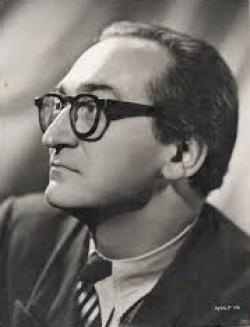LEGENDS OF
LIGHT MUSIC
Francis Chagrin

FROM RUMANIA TO
ENGLAND: The Musical Career of
FRANCIS CHAGRIN (1905-1972)
By Philip L Scowcroft
Chagrin was born
Alexander Paucker in Bucharest on
15 November 1905 and initially
trained (in Switzerland) as an
engineer, changing course to a
musical career, despite family
opposition, in the 1930s. He
studied first in Paris (with
Nadia Boulanger and Paul Dukas
ofSorcerer’s Apprentice
fame) while earning money playing
the piano in night clubs and
composing light music, and then
in London with Matyas Seiber. He
settled here in 1936 and married
an English girl, by whom he had
two sons. He died on 10 November
1972.
During the war he
worked as musical director and
composer for the French section
of the BBC Overseas Service
(1941-44) for which the French
government later decorated him.
He retained his connections with
the Corporation thereafter. Also
during the War (1943) he founded
and ran the Committee for the
Promotion of New Music (later
SPNM) to help build a platform
for younger composers to have
their works heard. This is not to
say that his own compositions
were avant garde. Serious music
he did produce, but this was
always accessible and one
suspects that did not commend him
to the BBC music hierarchy in the
Glock era. Certainly his two
symphonies (1959, published 1967,
and 1970), rather French in
idiom, were not often played, nor
were his Piano Concerto, Wind
Octet and string orchestra pieces
like Lamento Appassionato,
Prelude and Fugue, premiered at
the Proms in 1947, and an Elegy.
However he had
considerable success with his
lighter music which also included
works for string orchestra: Three
Bagatelles, the five Aquarelles
(portraits of five children) and
Suite Mediévale. Like many light
music figures he relished
composing "old"
pastiche music, other examples
for fuller orchestra being a
Renaissance Suite, similar to
Warlock’s Capriol, the
Orchestral Suite No. 1 and
theSarabande for oboe and strings
(or piano). Chagrin conducted
various orchestras, including
some ballet ensembles (he indeed
composed music for ballets) and
his own Chagrin Ensemble, so it
was not surprising he wrote so
many orchestral miniatures,
dances like Mirage (a tango),
Concert Rumba andCastellana (a
Spanish dance) and other
miniatures including Chanson
d’Amour, Reverie, Thrills of
Spring, Promenade, Berceuse,
Clockwork Revels, Trickery and
Alpine Holiday, arranged by
Ronald Hanmer, which could serve
as concert items or, hopefully,
as "library" music. In
1956 the BBC commissioned him to
write the Rumanian Rhapsody for
harmonica and orchestra (at that
time Larry Adler was in his pomp)
for the Light Music Festival of
that year. For non-orchestral
instrumental combinations most of
his output was light in character
and much of it was appropriate
for younger musicians including
the Divertimenti for wind and
brass quintets, Four Lyric
Interludes, All Together Now, for
wind band, Improvisation and
Toccatina for clarinet and piano,
recorder pieces (in which he
derived inspiration from the work
of Carl Dolmetsch) and the
Olympic Sketches for a quartet of
clarinets (I suspect these were
inspired by London’s Olympic
year of 1948).
Chagrin wrote
large quantities of incidental
music, for the theatre, including
Shakespearean productions, at
least three songs from which
achieved publication, for films,
for radio and later for TV. So
much of this is, by its nature,
ephemeral, though occasionally
there was an opportunity to
recycle, as with The
Beggar’s Theme (from the
film "Last Holiday")
and the Yugoslav Sketches, from a
documentary film of 1945. No such
rescue work was done on the
scores for well-remembered large
screen features like "An
Inspector Calls", adapted
from J B Priestley, and "The
Four Just Men" and "The
Clue of the Twisted Candle",
both adapted from Edgar Wallace.
Altogether Chagrin composed over
200 film scores including those
for documentaries and Hoffnung
cartoons. His work for radio
included incidental music for
plays and also, interestingly,
"production music" like
Two Fanfares, Dutch Signature
Tune and Focus, Opening and
Closing Theme Music for which, as
the BBC owned the manuscripts,
suggest they had "cut out
the middlemen" of the music
publishers.
His writing for
the voice comprised mainly
arrangements of popular French
songs, a few original French
songs, and some English songs,
one taken from the 1954 film
"Colditz Story" and
others, with titles, such as Only
Tell Her That I Love Her,
We’ll Go No More A Roving
and Time of Roses, which suggest
they are slightly updated
drawing-room ballads. He compiled
various vocal medleys for radio
use including one,
unsurprisingly, of French
National Songs.
Chagrin may have
been particularly fond of French
music but several of his lighter
works show an awareness of the
British light music heritage. The
Nursery Suite (Daybreak,
Mischief, Daydreams and Playtime)
(1951) is a thematic orchestral
suite in the Eric Coates/Haydn
Wood template, while
Helter-Skelter, reworked film
music, is an example of the
light, bright British concert
overture. One or two of his
miniatures have, I believe, been
recorded during the last
generation, but we could do with
the revival of so much more.
In 2005 the CD
"The Film Music of Francis
Chagrin" was released on
Chandos CHAN 10323. The BBC
Philharmonic Orchestra Conducted
by Rumon Gamba plays
Chagrin’s music from Helter
Skelter, An Inspector Calls, The
Colditz Story, Greyfriars Bobby,
Four Just Men, The Intruder, Easy
Money, Last Holiday and The
Bridge. The Charles Williams 78
of the Beggar’s Theme from
the film ‘Last Holiday’
is also available on Guild GLCD
5109.
This article first
appeared in the Robert Farnon
Society’s magazine
"Journal Into Melody"
in June 2009.
|